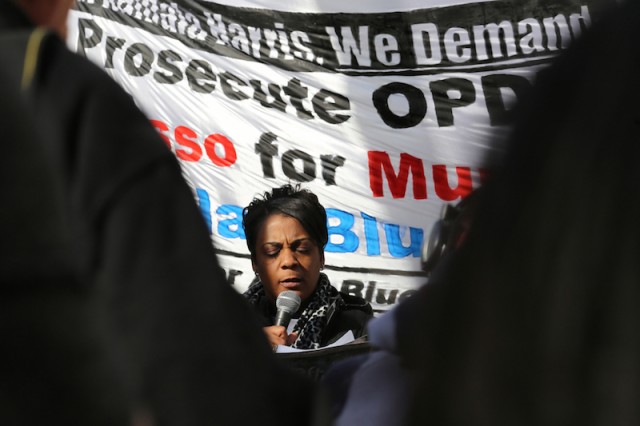“It’s never been about the money,” Jeralyn Blueford said. “It’s about the truth and what’s right and standing up for change. Had we not said anything, they could have swept everything under the rug.”
According to Blueford, Masso testified in his deposition that Post Traumatic Stress Disorder caused him to black out after he shot himself in the foot (a shot initially blamed on the victim) and doesn’t remember killing Alan.
“What he said in deposition was totally different from what he said in the police report,” she noted, “but [the Alameda County District Attorney] ruled it justified.”
“I just wanted to tell Alan’s truth. [Masso] didn’t follow procedures,” Blueford said, recalling the night of Alan’s death. “My son is shot and killed. They did not notify us. They pretended they didn’t know who he was.” She noted that the police washed forensic evidence from the scene before it could be examined.
As a policy, the Oakland Police Department does not comment on officer personnel information.
Asked if she would have liked to recognition from the City of Oakland and OPD that they were at fault in her son’s death, she said, “That’s how you make change. Admitting when you’re wrong and don’t do it again.”
On May 3, 2014, in honor of the two-year anniversary of Alan’s death, the Alan Blueford Foundation organized a community walk. “It was a way to heal. It was just showing unity and love,” she said of the approximately 200 people who joined the walk and shared music and art.
“Just the outpouring of love made me feel close to him,” she said. “I was able to tune into his spirit.” She added, “It made me feel honored and happy, sad, but at the same time, joy.”
The announcement of the monetary settlement from the city, which admitted no wrongdoing on the part of Masso or the police department when it agreed to settle, had the opposite effect: “It was like reopening the wound,” Jeralyn said. “At that moment, it was the feelings of pain and loss.”
“Who has closure for a loss of a child? I’ll live with that, unfortunately, for the rest of my life,” she said. “The thing is, what am I going to do with that pain?” Blueford vows to do what she can to bring justice to other mothers who have lost children. “There’s a bigger fight,” she said.
“We need people in the city who are going to hold the city and the police accountable,” she said. “I’m going to be using my voice.” She wants to reach out to other mothers through the foundation she started in her son’s honor.
This article was originally published on KQED News Associate site Oakland Local.
